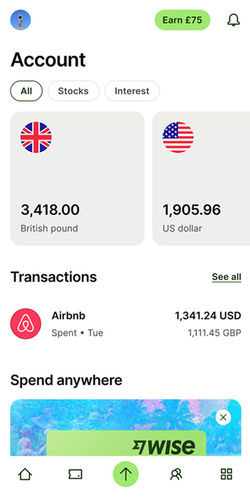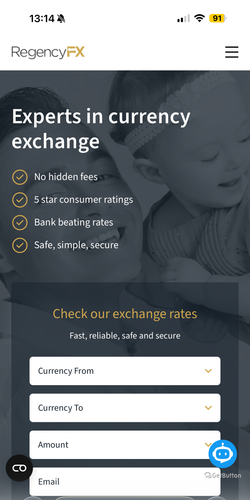Find the best ways to transfer money to Bahrain
Compare money transfer deals for sending BHD.
Find the best, cheapest, and easiest ways to send money to Bahrain at the best BHD exchange rates.
Read on for the best deals, expert information, and all you need to transfer money to Bahrain.
Send money to Bahrain
"Over 16 million customers use Wise, mostly for their excellent mobile app, transparent fee structure & use of mid-market rates. Now increasingly used for larger transfers."
"Over 16 million customers use Wise, mostly for their excellent mobile app, transparent fee structure & use of mid-market rates. Now increasingly used for larger transfers."
"Over 16 million customers use Wise, mostly for their excellent mobile app, transparent fee structure & use of mid-market rates. Now increasingly used for larger transfers."
"Xe has over 30 years of currency exchange experience, and is one of the most reputable names on the market. 200 countries, 100 currencies, & funds often received in seconds."
"Xe has over 30 years of currency exchange experience, and is one of the most reputable names on the market. 200 countries, 100 currencies, & funds often received in seconds."
"Xe has over 30 years of currency exchange experience, and is one of the most reputable names on the market. 200 countries, 100 currencies, & funds often received in seconds."
"Over 16 million customers use Wise, mostly for their excellent mobile app, transparent fee structure & use of mid-market rates. Now increasingly used for larger transfers."
"Over 16 million customers use Wise, mostly for their excellent mobile app, transparent fee structure & use of mid-market rates. Now increasingly used for larger transfers."
"Over 16 million customers use Wise, mostly for their excellent mobile app, transparent fee structure & use of mid-market rates. Now increasingly used for larger transfers."
"Revolut has 50+ million customers globally. You can hold up to 36 currencies in the app and send money quickly in 70+ currencies to 160+ countries."
"Revolut has 50+ million customers globally. You can hold up to 36 currencies in the app and send money quickly in 70+ currencies to 160+ countries."
"Revolut has 50+ million customers globally. You can hold up to 36 currencies in the app and send money quickly in 70+ currencies to 160+ countries."
"Key Currency offers a personal service with a dedicated account manager. There are no transfer limits or fees which is perfect for larger send amounts."
"Key Currency offers a personal service with a dedicated account manager. There are no transfer limits or fees which is perfect for larger send amounts."
"Key Currency offers a personal service with a dedicated account manager. There are no transfer limits or fees which is perfect for larger send amounts."
"Xe has over 30 years of currency exchange experience, and is one of the most reputable names on the market. 200 countries, 100 currencies, & funds often received in seconds."
"Xe has over 30 years of currency exchange experience, and is one of the most reputable names on the market. 200 countries, 100 currencies, & funds often received in seconds."
"Xe has over 30 years of currency exchange experience, and is one of the most reputable names on the market. 200 countries, 100 currencies, & funds often received in seconds."
"OFX have been helping individuals and businesses send money for over 25 years. Transfer in 50+ currencies to 170+ countries, with 24/7 phone access to currency experts."
"OFX have been helping individuals and businesses send money for over 25 years. Transfer in 50+ currencies to 170+ countries, with 24/7 phone access to currency experts."
"OFX have been helping individuals and businesses send money for over 25 years. Transfer in 50+ currencies to 170+ countries, with 24/7 phone access to currency experts."
"Regency's UK-based account management team has vast experience. Get support on all kinds of transfers, from overseas property transactions to business payments & more."
"Regency's UK-based account management team has vast experience. Get support on all kinds of transfers, from overseas property transactions to business payments & more."
"Regency's UK-based account management team has vast experience. Get support on all kinds of transfers, from overseas property transactions to business payments & more."
"Remitly focuses on sending money to friends and family in Asia, Africa and South America. Wide coverage and well-suited to regular transfers home."
"Remitly focuses on sending money to friends and family in Asia, Africa and South America. Wide coverage and well-suited to regular transfers home."
"Remitly focuses on sending money to friends and family in Asia, Africa and South America. Wide coverage and well-suited to regular transfers home."
"Xoom, a PayPal service, allows you to send money in more than 160 countries. You can send cash for over-the-counter pickup or home delivery, as well as send by bank transfer or debit card."
"Xoom, a PayPal service, allows you to send money in more than 160 countries. You can send cash for over-the-counter pickup or home delivery, as well as send by bank transfer or debit card."
"Xoom, a PayPal service, allows you to send money in more than 160 countries. You can send cash for over-the-counter pickup or home delivery, as well as send by bank transfer or debit card."
"Moneycorp is an established player in the market, with a focus on private clients and corporates. Make overseas payments in over 120 currencies and 190 countries."
"Moneycorp is an established player in the market, with a focus on private clients and corporates. Make overseas payments in over 120 currencies and 190 countries."
"Moneycorp is an established player in the market, with a focus on private clients and corporates. Make overseas payments in over 120 currencies and 190 countries."
"Moneygram is a well established service with over 80 years in the sector. They support over 200 countries worldwide and have over 440,000 retail locations."
"Moneygram is a well established service with over 80 years in the sector. They support over 200 countries worldwide and have over 440,000 retail locations."
"Moneygram is a well established service with over 80 years in the sector. They support over 200 countries worldwide and have over 440,000 retail locations."
How to get the best rate when sending money to Bahrain
Always compare rates
Don't pay more than you have to. Use our live comparison tool to make sure you aren't missing the best BHD rates.
Choose a provider
Select the provider that offers you the most BHD and fits your needs.
Click, sign up & transfer
Follow the steps & make your transfer. Your BHD will soon be on the way.
The best way to send money to Bahrain: Wise
After reviewing and testing 10 money transfer providers supporting BHD transfers, we found Wise to be the top choice for money transfers to Bahrain as of December 2025.
With quick transfers, a low markup of -0.02% on BHD exchange rates, and a low fee of $60.74, Wise offers the ideal balance of cost, speed, and features for BHD transfers.

The cheapest way to send money to Bahrain: Key Currency
From the 10 companies tested, Key Currency consistently offers the cheapest money transfer BHD to Bahrain.
Key Currency charges $0 per transfer to Bahrain and applies a 0.25% markup on the BHD exchange rate.
For the best value, use a bank transfer deposit to maximize the amount of BHD received.

Regency FX is the fastest way to send money to Bahrain
With Regency FX, the transfer time to Bahrain is minutes - 24 hours.
charges $0 and adds a markup of 0.27% on top of the BHD exchange rate. This is 0% cheaper than the next best option as of December 2025.
For the best combination of speed and cost, we recommend using a to fund your transfer to Bahrain.
*This is based on a $7,000 transfer to Bahrain.

Wise is the easiest way to send money to Bahrain
Wise is very transparent with its fees, charging $60.74 and -0.02% markup on BHD transfers.
They offer multiple deposit options, have good customer service, and take less than 5 minutes to get started with.

Everything you need to know when sending money to Bahrain
Don’t just settle for the most popular option—always compare.
Most transfers/payments to Bahrain include fees and add a markup on the ‘real’ BHD exchange rate.
The total cost of your transfer to Bahrain can vary based on your deposit and delivery methods, the amount of BHD transferred, and where you're located.
Our comparison covers 10 money transfer services that support Bahraini Dinar transfers, helping you find the best fit for your needs.
Sending large amounts of money to Bahrain
Sending large amounts to Bahrain can be expensive. You should consider the exchange rate, transfer limits, customer service, safety, company experience with large transfers, and any legal requirements in Bahrain.
In this case, Wise ticks all the boxes. Out of 10 money transfer companies serving Bahrain, Wise came on top as the highest-rated company for BHD transfers.
Whether you are buying a property in Bahrain, funding your education, having a destination wedding, or just need to send a lot of BHD, we recommend opting for a specialized provider such as Wise.

Understand the costs of money transfers to Bahrain
The total cost of BHD transfers depends on your location, the amount of BHD sent, the delivery/deposit methods, transfer fees, and the markup applied to the BHD exchange rate.
Transfer fee
The money transfer service you use to send Bahraini Dinar can apply a fixed fee, a percentage-based fee, or a combination of both.
For example, a $7,000 transfer to Bahrain will cost you $0 in fees with Key Currency, based on our December 2025 analysis of 10 services supporting Bahraini Dinar transfers.
BHD exchange rate markup
An exchange rate markup is the percentage added to the mid-market BHD rate.
Using the same example, Wise offers the best BHD exchange rates, with a -0.02% markup on the USD-BHD rate. This means for every USD sent, you receive 0.377 BHD with -0.02% deducted from it.
Deposit method
How you fund your transfer can significantly impact the overall cost.
Bank transfer is the most common option, costing up to $490 per transfer to Bahrain.
Debit card transfers can go as high as $0 in fees, while credit cards are usually more expensive and may include additional cash advance fees.
bank transfer is the cheapest payment method for sending BHD.

Getting the best BHD rate when sending money to Bahraini Dinar
The exchange rate is the value of the Bahraini Dinar (BHD) compared to other currencies. Since it consistently moves up and down, sending at the high will give your receiver more BHD compared to the low.
In the past 7 days, the BHD exchange rate reached:
An average rate of 0.3769 Bahraini Dinar per US Dollar
A high of 0.377 BHD per USD
And a low of 0.3763 BHD per US Dollar
The BHD/USD exchange rate has seen some movements. Making a transfer when the rate is close to 0.377 BHD/USD will result in more BHD received.
Wise is our top recommendation for sending Bahraini Dinar, offering a markup of -0.02% which is 0% better than the next cheapest option.
Get notified when it’s the best time to transfer Bahraini Dinar
Sign up for our rate alerts, and we’ll notify you when it’s the best time to send BHD!
Payment methods available for money transfers to Bahrain
The way you fund your transfer to Bahrain will impact the speed, cost, and amount of BHD your recipient receives.
Bank transfers
Bank transfer deposits are a common and reliable funding method for sending BHD, offered by most services covering Bahrain.
While bank transfers are typically more affordable, it may take up to 3 business days for the BHD to arrive in Bahrain.
In our testing of 10 providers, Key Currency appeared as the cheapest option for bank transfers to Bahrain, charging $0 per transfer with a 0.25% markup (0.02% cheaper than the next cheapest money transfer company).
Avoid using wire transfers to Bahrain over the SWIFT network, as they are slower and more expensive due to the bank intermediaries on the way to Bahrain. Instead, choose ACH or your local network option.

Credit cards
A credit card deposit is another option for BHD transfers.
Based on our comparison of 10 companies serving Bahrain, there are a few available options.
To get the best deal, we as CC transfer fees and rates can vary a lot depending on where you are.
CC deposits are usually more expensive when sending Bahraini Dinar, so if you can, opt for a bank transfer deposit or a debit card deposit.
Money transfer to Bahrain is an international transaction.
Your credit card company may apply a cash advance fee and higher interest rates for international payments to Bahrain. We recommend avoiding credit cards when sending money to Bahrain.

Debit and prepaid cards
Debit cards are typically faster but more expensive than bank deposits, with most BHD transfers completed within a few hours.
We recommend using Remitly for debit or prepaid card deposits.
With Remitly, you’ll pay a 1.05% markup on the BHD rate and $0 in fees when depositing money via the card. This is 1.92% cheaper than using the next cheapest option for transferring money to Bahrain.

How we analyze the market
We track the cost, speed, and product offerings of the leading money transfer services available in Bahrain.
Our comparison engine and algorithms evaluate providers based on over 25 factors, including transfer fees, ease of use, exchange rates, mobile apps, transfer times & customer support.
We also consider how these services are rated on platforms like TrustPilot, AppStore, and Google Play, giving you a comprehensive view of what to expect.
This thorough analysis helps you get the best available deal - every time you want to move money to Bahrain.
We also provide unbiased and detailed reviews of all the top money transfer companies. You can use these reviews to find the best service for your needs when sending money to Bahrain
For a deeper understanding of our commitment to integrity and transparency, we invite you to read our editorial policy and review methodology.

Related transfer routes
Send money from Bahrain
FAQs
Find answers to the most common questions on our dedicated FAQ page.
Are there tax implications when sending money to Bahrain?
Are there any limits on how much BHD I can send to Bahrain?
Can I make regular BHD transfers/payments to Bahrain?
How long does it take to transfer money to Bahrain?
What are the fees and exchange rates for sending BHD from abroad?
Why can’t I use my bank to wire money to Bahrain?
What is the official currency used in Bahrain?
Can I transfer money to Bahrain from any country?
What should I do if something goes wrong with my transfer to Bahrain?
Can I use MoneyTransfers.com to transfer funds to Bahrain?
Tools & resources
Contributors






.svg)






.svg)




